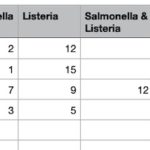With grilling season upon us and the Fourth of July holiday next week, most Americans are taking to their outdoor grills. We grill everything from chicken wings to veggies to burgers to steaks. But do you know if you are grilling mechanically tenderized beef? There are several ways of tenderizing meat: marinating, the way you cut it after it's cooked, and mechanical tenderizing. Knowing if the meat you are grilling is mechanically tenderized can make the difference between enjoying a nice meal and getting sick. And there's a lot of mechanically tenderized beef out there: 6.2 billion servings of mechanically tenderized beef are served every year on American tables. The USDA is offering tips on how to protect yourself and your family while grilling. One section of that piece … [Read more...]
Ten USDA Tips To Keep Restaurant Leftovers Safe at Home
The USDA is offering ten tips to keep restaurant leftovers safe when you take them home. Now that the COVID-19 pandemic is easing, more people are going out to eat. But how you handle doggie bags can have an impact on your health. Firsts of all, if you are having dinner before going to a movie or shopping, do not take leftovers. Perishable food needs to be refrigerated within two hours after it comes out of the oven or fridge. Since it probably took you about an hour to eat, you don't have much time to refrigerate the food. Second, bring the food directly home. The faster you get it into the fridge, the lower the chance that bacteria will grow. Third, you can refrigerate meat and poultry leftovers at 40°F or below for four days. Eggs and lunch meats can be stored in the fridge … [Read more...]
Salmonella Hadar Outbreak May Be Linked to Turkey
The USDA is investigating a Salmonella Hadar outbreak that may be linked to turkey, according to its outbreak investigation table. There is no information about the number of people who have been sickened, illness onset dates, the patient age range, or if anyone has been hospitalized or has died. The government does not provide any more information about these outbreaks unless there is some action that can be taken by consumers, such as a recall, or if the USDA has issued a public health alert or after-action review report. Salmonella outbreaks linked to turkey have occurred in the past decade. Several serotypes have been represented in those outbreaks, including Salmonella Hadar. Those outbreaks include: In 2019 and in 2018, a very large and complicated Salmonella … [Read more...]
Did You Get Unsolicited Seed Packets in the Mail? The USDA Has Answers
Did you get unsolicited seed packets in the mail in the past few months? The USDA has some answers. The government received thousands of reports from people who got these packets and has completed a months-long investigation. The USDA's Animal and Plant Health Inspection Service (APHIS) is providing guidance to help people, as well as those who buy plants and seeds online from other countries. U.S. consumers began receiving strange packets of seeds in the mail starting in July 2020. Some were sent to recipients unsolicited, but others were those people ordered, since they were unaware that they were coming from a foreign country. Most of these shipments are illegal since they came into the country without a permit or a phytosanitary certificate. Plant Protection and Quarantine … [Read more...]
What Are the Symptoms of Common Food Allergies?
Food Poisoning Bulletin publishes recalls of food for undeclared allergens from the FDA, USDA, and CFIA every week. These recalls affect just about every food on the market. Food allergies can cause reactions that range from mild to life-threatening. So what are the symptoms of common food allergies? People can be born with food allergies, or they can appear at any time during the lifespan without warning. Some people grow out of their allergies, while others are lifelong. And children are more likely to be allergic to foods than adults. There are some symptoms that are common to most allergens. They include tingling of the mouth, lips, and tongue; itching, rash, and hives; congestion or runny nose; nausea, vomiting, and diarrhea. These are usually early symptoms that may appear … [Read more...]
History of E. coli O145 Outbreaks in the United States
There are three active multistate food poisoning outbreaks on the USDA outbreak table: One is for an outbreak caused by Listeria monocytogenes, one caused by Shiga toxin-producing E. coli O157:H7, and one caused by Shiga toxin-producing E. coli O145 bacteria. The last one may be linked to ground beef. Let's look at the history of E. coli O145 outbreaks. What is the history of E. coli O145 outbreaks in the United States? This pathogen is part of the Big Six STEC bacteria group that the USDA classified as adulterants back in 2011. The government started testing for the bacteria as part of a zero tolerance policy in 2012, but it has not been linked to many outbreaks. According to the Centers for Disease Control and Prevention, there was a multistate outbreak caused by E. coli O145 … [Read more...]
USDA Withdraws Controversial Poultry Line Speed Rule
On Friday, January 22, 2021, the USDA withdrew a controversial poultry line speed rules from the previous administration that would have rolled back line-speed standards at poultry plants. The first such proposal was made by the Obama administration in 2012. At the time, and over the last nine years, food safety experts and consumer advocates have opposed increasing these speeds, which whip poultry carcasses past inspectors at three birds per second. Executive Director of Food and Water Watch's Wenoah Hauter, said in a statement, "Such speeds would have made it nearly impossible for inspectors to properly due their jobs and ensure food safety and public health." She continued, "We’re pleased that the Biden administration has resisted the bidding of the immensely powerful … [Read more...]
2020 Meat and Poultry Recalls Hit All-Time Low
In-Depth Analysis From Food Poisoning Bulletin Who’s Been Minding our Meat? When Food Poisoning Bulletin began a review of food recalls in 2020, we discovered there had been a dramatic decline in the number of recalls for meat and poultry but not for other food products. To find out why, we analyzed five years of recall data published by the U.S. Department of Agriculture's Food Safety and Inspection Service (USDA FSIS), the federal agency that regulates meat, poultry, and egg products. Our research showed that meat and poultry recalls plummeted to an all-time low this year. Just 29 recalls were issued for meat and poultry in 2020 (through December 10) and only one of them was for bacterial contamination. Those numbers are a fraction of the annual averages since 2016 - 128 total … [Read more...]














